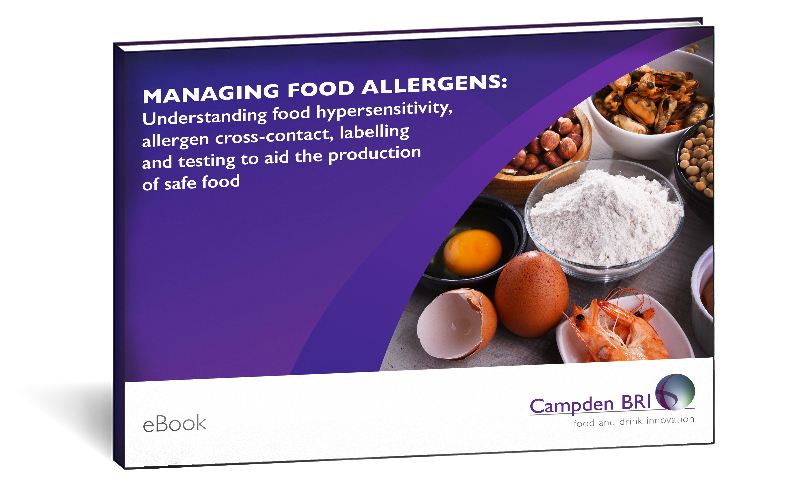
Evaluating the food information, labelling and unintended food allergen presence of imported prepacked foods and drinks purchased online
30 September 2024 | Christopher James, Safety and Quality Specialist – Allergens
Food allergy affects 3-10% of adults and 8% of children globally. Food business operators must accurately label food products, or provide information, to allow consumers to make safe choices about the food they consume, and to comply with legislation where applicable.
Frequent food and drink product recalls occur globally due to incorrect labelling of food allergens and their unintended or undeclared presence.
With the frequent product recalls relating to food allergen labelling, industry need to consider the specific issues behind this trend and what can be done to improve. With more consumers increasingly shopping online, this area warrants particular focus.
Download our FREE Managing Food Allergens eBook today! Secure food safety, control and confidence through effective allergen management

This research study, conducted in collaboration with the University of Nottingham, aimed to evaluate the accuracy and compliance of information and labelling of substances or products causing allergies or intolerances in prepacked food and drink products imported from Asia and purchased online in the UK.
The research
A total of 768 randomly selected prepacked products, from 12 countries in Asia, were sourced from 8 UK retailers (6 specialist retail food stores and 2 major supermarkets) and classified into 16 product categories for assessment.
Furthermore, ELISA methodologies were used to detect milk and peanut allergens in a sub-group of 77 products, divided into 4 food allergen labelling categories.
The findings were as follows:
- Of the 768 randomly selected prepacked products, 173 (22.5%) presented precautionary allergen labelling (PAL).
- PAL was identified with 24 different phrasings.
- Comparing food allergen information online vs. on pack, 36 (36.0%) carried inconsistencies on pack to online pages and 15 (15.0%) were not consistent.
- Following ELISA analysis, 24 (31.2%) contained unintended food allergen presence, ranging from 0.2 to 6780.0 mg/kg.
- Of these, 9 (37.5%) had a risk ratio ≥ 1, recommending PAL, though 7 (29.2%) lacked PAL to communicate food allergen risks.
- A further 10 products (13.0%) overused PAL and 2 products (2.6%) used PAL correctly.
This research indicates there is a need for further refinement of policies, to support food businesses to adopt and implement robust and effective food allergen management and food safety culture practices, to ensure adequate, accurate, clear and current food allergen information and labelling of products. These actions will aid consumers and protect people with food hypersensitivity including food allergy.
Food business operators need to implement effective food allergen management and food safety culture practices, so that they can provide consumers with accurate, clear and current food allergen information and labelling.
The full research paper can be found in Food Control .
Previous research conducted on current and emergent allergens in food production systems includes a scoping review of the global prevalence and severity of kiwifruit allergy and a review of the existing literature focused on algal induced food allergy in humans.
Research into the global prevalence and severity of kiwifruit allergy
The production and use of kiwifruit, and their derived products, has seen rapid growth in the food industry. Its use is increasing, including in more types of products, in different ways, and being processed into other ingredients (e.g. flavourings and functional ingredients). Key areas of development have been in the increased use of kiwifruit due to their nutritional and health benefits, current dietary trends and the use of waste streams to support sustainable food production systems.
However, kiwifruit is emerging as a common elicitor of food allergy worldwide. This research therefore focused on summarising the current literature on kiwifruit induced human food allergy.
The key findings were as follows:
- Prevalence of food allergy to kiwifruit has been reported in a wide population globally, ranging from 0.1–0.2% to 60.0% in ages 0–18 yrs and from 0.35% to 38.4% in those aged >18 – 96 yrs, with the incidence increasing.
- Research was included from within Europe, North America, Asia, Africa, South America and Oceania. Food allergens in kiwifruit have been identified to have cross-reactivity with other allergens from fruits and plants.
- Wide variation is suggested to occur in the levels of food allergens across kiwifruit varieties.
- Food allergy to kiwifruit ranged from oral allergy syndrome to anaphylaxis in humans.
Given the increased usage of kiwifruit across a range of food streams, further research is required due to the evidence of growing prevalence and high severity of kiwifruit allergy.
The full research paper can be found in the International Journal of Food Science and Technology .
Previous research conducted on current and emergent allergens in food production systems includes a scoping review of the global prevalence and severity of kiwifruit allergy and a review of the existing literature focused on algal induced food allergy in humans.
Need help with food allergen management?
Dealing with food allergens can be challenging – but our teams are here to help you manage them effectively and communicate accurate information to your consumers.
With over 100 years of expertise, we are well-equipped to help food business operators implement robust and effective food allergen management and food safety culture practices. Our experience extends beyond food hypersensitivity and encompasses a holistic understanding of global food safety, quality and regulatory requirements.
Through our knowledge of food allergen management, best practices and the latest updates in legislation, we can help ensure adequate, accurate, clear and current food allergen information and labelling of products.
We offer a range of services to support your food allergen management needs, including; allergen training courses, testing, and practical support with cleaning validation, hygienic design, food safety management systems, and labelling and legislation.
For more information, please contact:
Food allergen labelling and other legislation issues:
Food allergen management:
Managing Food Allergens eBook
Download our FREE Managing Food Allergens eBook today! Secure food safety, control and confidence through effective allergen management.







